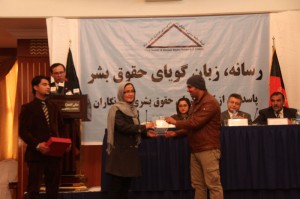The message of the Civil Society and Human Rights Organization (Network)
In the name of Almighty Allah The message of the Civil Society and Human Rights Organization (Network) 29 January 2011 Kabul – Afghanistan We have received the sad news of a suicide attack in Wazir Akbar Khan district of Kabul city. The attack killed a number of innocent people. Mrs. Hamida Barmaki, the Commissioner of the Afghanistan Independent Human Rights Commission and her five family members were amongst the victims. Allah may bless all of them. The Civil Society and Human Rights Organization (Network), condemn this brutal act against human values and human dignity. Killing of civilians and innocent people is against the Islamic values, the national and international law and humanitarian values. The suicide attacks badly damage peace building, reconciliation and state building process in Afghanistan . Such actions strongly affect the Afghan people psychologically as well morally. The Civil Society and Human Rights Organization (Network), expresses its deep condolences to the families of the victims of this inhuman action. We would like to stand beside our partner organization the Afghan Independent Human Rights Commission in this difficult period of time. The death of our innocent colleague and a good friend of civil society, Mrs. Hamida Barmaki, is a great miss amongst human rights family and civil society activist in Afghanistan. Civil Society and Human rights Organization (Network)
